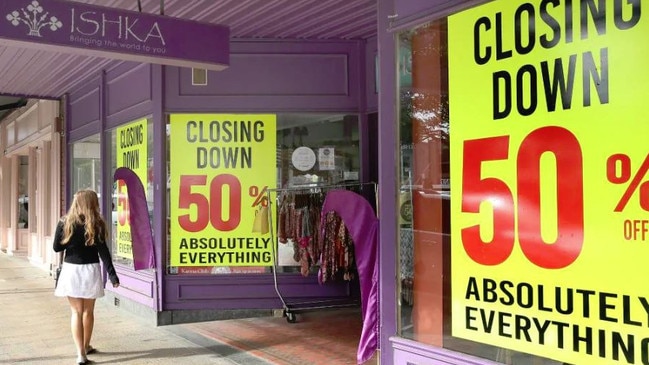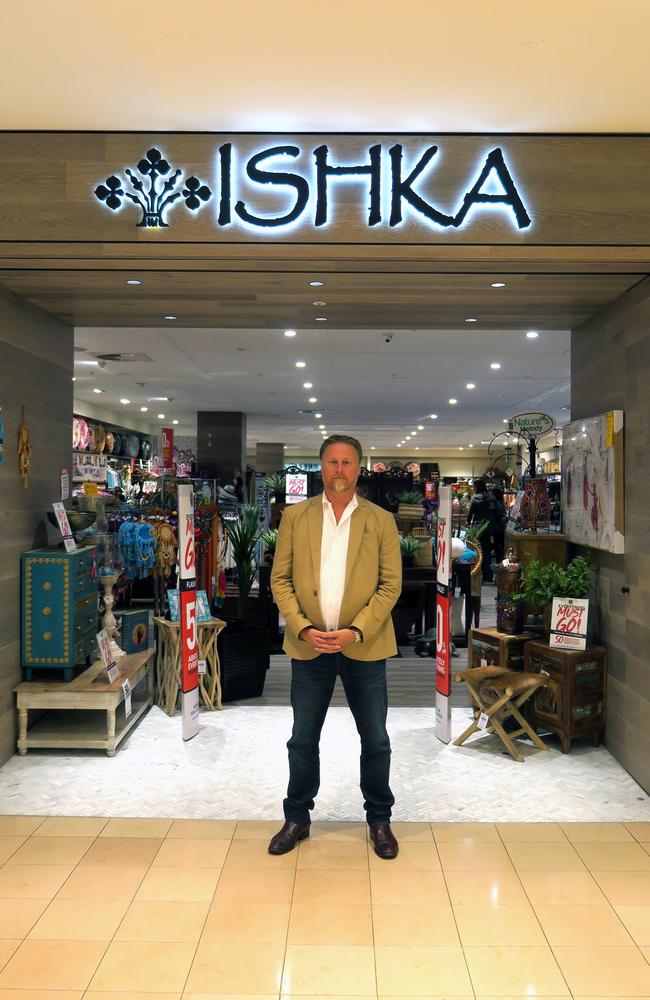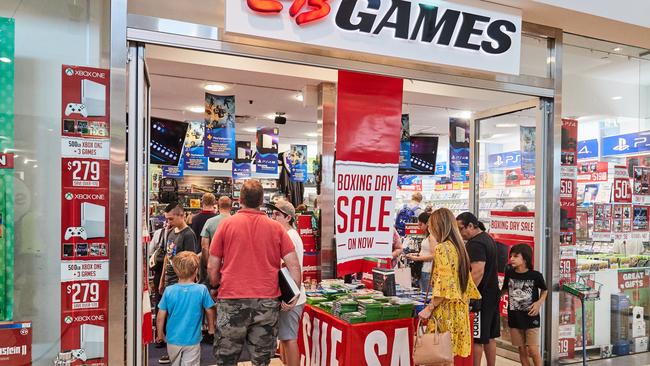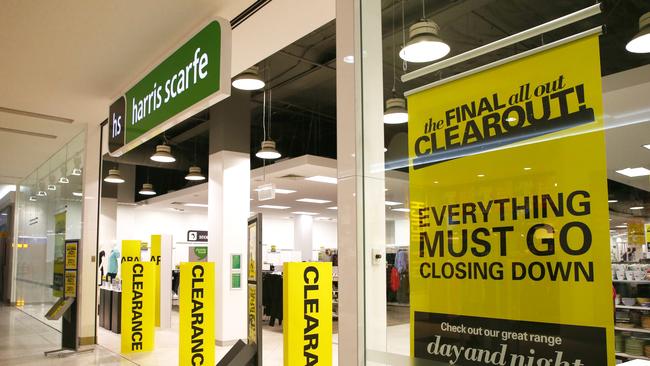Homewares chain Ishka becomes Australia’s latest retail victim
Yet another Australian retailer has fallen victim to our brutal retail killing season, with a popular homewares brand now facing ruin.

Retail
Don't miss out on the headlines from Retail. Followed categories will be added to My News.
A popular homewares chain has become the latest victim of Australia’s “retail apocalypse”.
Ishka, an Australian home furnishing store, has gone into voluntary administration, with the company launching a “total clearance” sale with its website revealing “everything must go”.
The family-owned chain was founded 50 years ago and there are 60 stores across the country, including 15 in country areas, with more than 450 staff members on the payroll.
Ishka sells handmade crafts, homewares, gifts, clothing, furniture and jewellery from throughout the world, and was started in a small workshop in Glen Iris, Melbourne.
Ishka owner Toby Darvall told news.com.au the collapse came “out of the blue” and was the result of two “catastrophic” factors.
He said Australia’s unusually challenging summer period, coupled with a devastating delay of more than $3 million worth of Christmas stock, had crippled the business.
“It has been a devastating 24 hours for us. We came into December actually trading really strongly and looking really good so we were quite excited about Christmas,” he said.

“We had a good digital week in November and Black Friday and Cyber Monday went crazy.
“But unfortunately in late November, quarantine seized 32 components of Christmas stock. Normally that would be released quite quickly … but a week later it hadn’t arrived, and then a week after that we were starting to get concerned, and then another week later in mid-December I thought, ‘my God, we’re not going to get our Christmas stock’.”
The crucial items didn’t arrive until late January, which meant the store missed the vital holiday trade period.
The disaster occurred because the person responsible for fumigating the stock overseas before it departed for Australia lost their certificate, meaning the goods had to be treated again upon arrival on home soil, which created a backlog.
Then, the bushfires crisis hit, along with other recent extreme weather events affecting large parts of the country including the drought, floods and hailstorms followed by the coronavirus, which Mr Darvall said created a “perfect storm” which battered the already-fragile retail sector.

“We were hit from all angles – we met with the experts and the accountants in mid-January to ask what we could do and what options we had but it became pretty clear we didn’t have any,” he said.
“I started my first business at 19 and have seen the highs and lows but this is way off the scale and I’ve never seen anything like it – it’s almost at biblical proportions, with fires, droughts, storms, floods and then a virus – who would have thought that would happen?”
But Mr Darvall said while it was still early days, he had been overwhelmed with the response from customers since news of the collapse broke and that he was taking the unusual step of speaking out to send the message the company was doing everything possible to save jobs.
“The response has been unbelievable – online sales have reached almost record levels and we’re seeing the same things in stores, with queues of wonderful customers coming to express their concern and buy up,” he said.

“If this continues, this could be the miracle that saves Ishka. What we desperately need is for people to come out and try and support us and other retailers as much as they can, and if this continues, we may have a chance of surviving.
“We don’t want charity or a handout but if you come to a store and buy something beautiful that you love, it could save someone’s job.
“After a catastrophic Christmas and summer we realised everything wasn’t right so we’ve been flat out working on solutions to protect staff, suppliers, landlords and creditors. We’ve done everything and explored every option we could to save the business and we are working very closely with our bank. This is a heartbreaking decision to make.”

Rachel Burdett of Cor Cordis has been appointed administrator of the business, and will convene a meeting of creditors within a week.
At this stage, all stores remain open.
Ishka trades with and sources stock from developing communities, supporting artists, craftsmen and makers from around the world.
RETAIL WOES
The announcement comes hot on the heels of a slew of other high-profile Australian businesses that folded in the first fortnight of 2020.
It started early on January 7 when it was revealed department store Harris Scarfe was set to shut 21 stores across five states over the course of just one month after the retailer was placed into receivership in December.
Just days later, McWilliam’s Wines – the country’s sixth-largest wine company which has been run by the same family for more than 140 years – announced it had also appointed voluntary administrators.
Then it was popular video game chain EB Games’ turn, with the business confirming it was closing at least 19 stores across the country within weeks, while fashion chain Bardot is also planning to shutter 58 stores across the nation by March.

In January it also emerged Curious Planet – the educational retailer previously known as Australian Geographic, which is owned by parent company Co-op Bookshop – would pull 63 stores across Australia after failing to find a buyer for the brand, while denim chain Jeanswest entered voluntary administration that month and tech giant Bose also revealed it would close all Australian stores and 119 across the globe largely as a result of the rise of online shopping.
The total confirmed number of bricks-and-mortar stores earmarked for closure has already risen to 161 this year alone.
This year German supermarket Kaufland also pulled out of Australia before it had even begun, investing millions into the expansion before making a hasty exit this year to focus on its European offerings.
And handbags and accessories chain Colette by Colette Hayman was also placed into voluntary administration in late January, leaving 300 jobs and 140 stores in the lurch.
2020s dismal first fortnight for retail follows a horror 2019 that brought the collapse of a slew of Aussie businesses, with some international players also folding in recent months.
Last January, menswear retailer Ed Harry went into voluntary administration, and a week later, Aussie sportswear favourite Skins also revealed it was on the brink of failure after applying for bankruptcy in a Swiss court.
At the end of the month, the Napoleon Perdis beauty empire appointed administrators although it was saved from liquidation by KUBA Investments three months later.
Footwear trailblazer Shoes of Prey also met its demise in March last year along with British fashion giant Karen Millen, which in September revealed it would soon shut all Aussie stores, leaving around 80 jobs in peril.

In October, celebrity chef Shannon Bennett’s Melbourne burger chain Benny Burger was also placed into administration, followed by seven Red Rooster outlets in Queensland just days later and then Aussie activewear sensation Stylerunner, which has since been sold to Accent Group Limited.
In November, it was revealed that popular furniture and homewares company Zanui was in trouble after it abruptly entered voluntary administration, leaving angry customers in the lurch.
Later that month, Muscle Coach, a leading fitness company, was put into voluntary administration after a director received a devastating diagnosis and the company racked up debts of almost $1 million.
Then it was the famous Criniti’s restaurant chain’s turn to enter into voluntary administration, with several of the 13 sites across the country set to close for good. It was closely followed by discount legend Dimmeys.
Leading Australian fashion designer Alex Perry closed his only bricks and mortar store in Sydney’s Strand Arcade in February, announcing he will focus solely on online.
Originally published as Homewares chain Ishka becomes Australia’s latest retail victim

